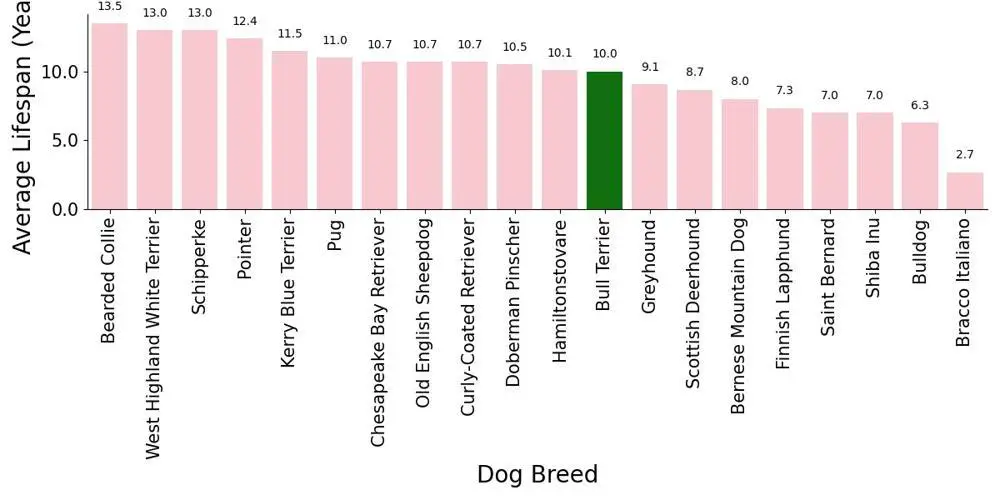Quick Links: Table of Contents
- How Long Bull Terriers Live. Bull Terrier Life Expectancy
- Lifespan of the Bull Terrier Compared to Other Dog Breeds
- Common Causes of Death in Bull Terrier, and how to Prevent Them.
- How To Prevent Genetic Problems in Bull Terriers
- How Old is Your Bull Terrier in Human Years
- How Long Do Bull Terriers Live in Human Years?
- More Ways to Make Your Bull Terrier Live Long
- Conclusion on Bull Terrier Life Expectancy
How Long Bull Terriers Live. Bull Terrier Life Expectancy
Generally, the lifespan of the Bull Terrier is from 10 to 15 years.
Moreover, a few years back, British Veterinarinan researchers performed a scientific study to determine the lifespan of the Bull Terrier. In this study, the scientists collected data on how long 209 pet Bull Terriers lived.
From the study, it was found that Bull Terriers have a average lifespan of 10 years. Furthermore, the study found that Bull Terriers can live for as long as 18.5 years.
Furthermore, researchers from the University of Georgia conducted a study to find out what are the top causes of death in Bull Terriers.
According to the study, the top 5 causes of death in Bull Terriers are:
- Neoplastic Disease: Issues involving tumors
- Gastrointestinal Disease: Any problems that affect the mouth, esophagus, stomach, intestines, colon, or rectum.
- Urogenital Disease: Problems with the kidneys, urinary tract, and/or reproductive organs
- Infectious Disease: Problem caused by bacteria, viruses, parasites, or fungi.
- Trauma: Issues involving injury
In this article, we will explain each of these diseases and discuss how to prevent the early occurence of each in your Bull Terrier to make your Bull Terrier live a longer.
Also, in this article, we will discuss other things you can do to ensure that your Bull Terrier have a longer than average lifespan.
Do you want to know how old your Bull Terrier is in human years? Then, check out our Bull Terrier age to human years calculator

Lifespan of the Bull Terrier Compared to Other Dog Breeds
See in the table below how the lifespan of the Bull Terrier compares to the lifespan of other dog breeds.
| Dog Breed | Average Lifespan (Years) |
|---|---|
| Bearded Collie Lifespan | 13.50 |
| West Highland White Terrier Lifespan | 13.00 |
| Schipperke Lifespan | 13.00 |
| Pointer Lifespan | 12.40 |
| Kerry Blue Terrier Lifespan | 11.50 |
| Pug Lifespan | 11.00 |
| Chesapeake Bay Retriever Lifespan | 10.70 |
| Old English Sheepdog Lifespan | 10.70 |
| Curly-Coated Retriever Lifespan | 10.70 |
| Doberman Pinscher Lifespan | 10.50 |
| Hamiltonstovare Lifespan | 10.10 |
| Bull Terrier Lifespan | 10.00 |
| Greyhound Lifespan | 9.08 |
| Scottish Deerhound Lifespan | 8.67 |
| Bernese Mountain Dog Lifespan | 8.00 |
| Finnish Lapphund Lifespan | 7.33 |
| Saint Bernard Lifespan | 7.00 |
| Shiba Inu Lifespan | 7.00 |
| Bulldog Lifespan | 6.29 |
| Bracco Italiano Lifespan | 2.67 |

Common Causes of Death in Bull Terrier, and how to Prevent Them.
We will now discuss the common causes of death in Bull Terrier, according to scientific research. Also we will provide you advice on how to prevent these problems in your Bull Terrier.
Here are the causes of death, starting from the most common cause
-
Neoplastic Disease in Bull Terriers
Neoplasms, or tumors, can be benign (like a lipoma), or malignant (cancer).
Neoplastic Disease is responsible for 21.5 percent of all deaths in Bull Terriers.
Causes of Neoplastic Disease in Bull Terrier
Neoplasms in dogs, just like in people, are caused by either a genetic predisposition (like some breast cancers), an environmental factor (like smoking in humans), or a combination of both.
How to Prevent Neoplastic Disease in Bull Terriers
Just like in humans, there is little you can do to prevent cancers that are caused by genetic factors. You can, however, reduce the environmental risks that are associated with cancer. The `environmental` causes of neoplasia are chemical agents, infectious agents, and physical agents. An example of a chemical agent that could cause cancer in Bull Terriers (and humans) is asbestos. An example of an infectious agent that could cause cancer in Bull Terriers is the virus called canine adenovirus. An example of a physical agent that can cause cancer in Bull Terriers is UV radiation from the sun, just like in humans.
Another way to prevent neoplasms in Bull Terriers is to vaccinate them against harmful viruses, such as canine adenovirus (DHPP vaccine at 8 and 12 weeks and then once a year, every year). As in humans, early diagnosis is the key to supporting Bull Terriers with neoplasms, so talk to your veterinarian if you find any new lumps, bumps, or discoloration on your Bull Terrier. You should also talk to your veterinarian if your Bull Terrier`s gums look pale.
-
Gastrointestinal Disease in Bull Terriers
Gastrointestinal diseases includes vomiting, diarrhea, nausea, stomach upset, blockages, toothache, constipation, and more.
Gastrointestinal Disease is responsible for 14.9 percent of all deaths in Bull Terriers.
Causes of Gastrointestinal Disease in Bull Terrier
GI problems can be caused by a lot of different things. Often, GI problems like vomiting and diarrhea are caused by things that were eaten. It is best not to let your Bull Terrier eat human food or anything it finds outside, including garbage, plants and berries, fecal matter from other animals, and more. Vomiting, diarrhea, and stomach upset can also be caused by bacterial, viral, and parasitic infections. Another important sign of GI problems is when your Bull Terrier stops eating or eats less than usual. This can be caused by many things; sometimes it could be that your Bull Terrier is feeling nauseous, sometimes it could be that your Bull Terrier has mouth pain, and more. In these cases, it is best to see a veterinarian to get to the root of the problem.
How to Prevent Gastrointestinal Disease in Bull Terriers
An easy way to protect your dog from gastrointestinal problems is to make sure they are on heartworm, flea, and tick medicine all year long (no matter where you live). Many heartworm medications can also de-worm your dog every time you give a dose. This can prevent nasty parasites from settling into your dog`s intestines and causing pain, anemia, and other serious issues. Another way you can keep your dog feeling good is by taking good care of their teeth! This is especially an issue in small dogs. The best way to care for dog teeth is by cleaning them a few times a week. Here is a great brush for cleaning your Bull Terrier`s teeth. However, if your dog will not allow you to do that, dental treats like these are a good second option.
-
Urogenital Disease in Bull Terriers
Urogenital problems most often involve infections and blockages, which various degrees of seriousness.
Urogenital Disease is responsible for 14.9 percent of all deaths in Bull Terriers.
Causes of Urogenital Disease in Bull Terrier
Probably, the most important urogenital issue seen in intact female Bull Terriers is the pyometra. A pyometra is an enlarged, pus-filled uterus caused by a severe bacterial infection. A pyometra is several times larger than a regular uterus and is a life-threatening condition. To treat a pyometra, the Bull Terrier`s uterus must be removed, which is a difficult and expensive surgery. Another urogenital infection seen in both female and male dogs is urinary tract infections, which are very similar to human UTIs. If left untreated, UTIs can ascend up the urinary tract and infect the kidneys, which can also be life-threatening. If you notice that your Bull Terrier is urinating much more or less frequently than usual, or if the color or smell of the urine seems different from normal, you should talk to your veterinarian. Another common urogenital issue in male Bull Terriers is urinary blockages, which (as the name suggests) is when there is something stuck in the urinary tract which prevents the Bull Terrier from urinating. If you see your Bull Terrier lifting its leg and trying to urinate but nothing is coming out, you should call your veterinarian. Cancer is also a major urogenital issue in Bull Terriers, just like it is in humans. Urinary incontinence can also be an issue in both male and female Bull Terriers, just like in humans.
How to Prevent Urogenital Disease in Bull Terriers
The only way to completely prevent a pyometra is by getting your female Bull Terrier spayed. Another major benefit to spaying your Bull Terrier is that it dramatically reduces her risk of breast cancer. A spay is a major surgery and does tend to be a bit more expensive than a neuter, but a pyometra surgery is probably 3-4 times more expensive and dangerous than a regular, routine spay. Neutering your male Bull Terrier will also dramatically reduce his risk of prostate cancer and urinary blockages, especially as he gets older. If the spay and neuter estimates from your regular veterinarian are a little out of your price range, low-cost high-volume (LCHV) spay and neuter clinics are also an excellent option. If you find that your Bull Terrier is prone to blockages even though they are sterilized, there are many diets and supplements like this that can help. There are also diets like this and supplements that can help with urinary incontinence, but if these don`t work, your veterinarian can also prescribe prescription medications.
-
Infectious Disease in Bull Terriers
There are many types of infectious diseases: bacterial, viral, parasitic, and fungal infections. Different diseases have different causes and they affect different parts of the body. For example, E. coli causes an infection in the intestines which can cause diarrhea in humans and dogs, whereas Demodex is a parasite on dog skin.
Infectious Disease is responsible for 13.2 percent of all deaths in Bull Terriers.
Causes of Infectious Disease in Bull Terrier
All infectious agents fall into two categories: the ones that invade the body from the outside, and the ones that are living in or on the body that experience an overgrowth. For example, staphylococcus aureus is a normal bacteria found on the skin; however, it can cause skin infections if its growth gets out of hand. Both types of infectious agents can be stopped by the body`s immune response. Internal infectious agents can also be prevented by probiotics.
How to Prevent Infectious Disease in Bull Terriers
If your Bull Terrier seems like they are not doing well, you should take them to the veterinarian so they can decide if your dog needs antibiotics, fluids, a dewormer, or other therapies. When your Bull Terrier is well, you can support their immune health through nutrition, probiotics like this and vitamins.
-
Trauma in Bull Terriers
These includes cuts, bites, bruises, broken bones, wounds, scratches, and more.
Trauma is responsible for 13.2 percent of all deaths in Bull Terriers.
Causes of Trauma in Bull Terrier
One of the most common causes of trauma in Bull Terriers is getting hit by cats. Another common cause is bites and scratches from fighting or play with other dogs.
How to Prevent Trauma in Bull Terriers
The best way to keep your Bull Terrier from getting hit by a car is by having them on a fixed leash. Veterinarians do not recommend retractable leashes for dogs. This is because, oftentimes, dogs on retractable leashes will bolt into the road before their owners can lock the leash and get hit by cars, even though they were technically on a leash. Having a normal, fixed leash is also a good way to prevent your Bull Terrier from bolting on walks and getting into fights with other dogs before you can lock the leash.
Here is a good fixed leash that can save your Bull Terrier from traumatic accidents.

How To Prevent Genetic Problems in Bull Terriers
Every dog breed has a set of genetic problems to which it is predisposed, and the Bull Terrier is not an exception.
These disease will reduce your Bull Terrier`s qualilty of life. Also, these diseases can shorten your Bull Terrier`s lifespan.
The good news is that these diseases can be prevented in Bull Terrier offsprings by only breeding Bull Terrier that have been screened and cleared of genetic defects.
The Orthopedic Foundation for Animals (OFA) is one the organizations that keep records of which disease to which a dog breed is genetically prone.
The OFA provides breeders recommendations on which genetic diseases that breeders should screen their dog parents and puppies for.
If you want a Bull Terrier puppy that will grow up to be healthy and live long, make sure that your Bull Terrier breeder screens your puppy or your puppy`s parents for the health problems that the OFA recommends for your puppy`s breed. This will increase the chances that your puppy is free from genetic defects.
If you do not know if your Bull Terrier has been screened for genetic health problems, then your can use an at-home genetic screening kit like this one to check your Bull Terrier for genetic health problems at home. This might help you in deciding whether to get your Bull Terrier a pet health insurance.
The following are the health tests that Orthopedic Foundation for Animals (OFA) recommends that breeders should screen Bull Terriers for:

How Old is Your Bull Terrier in Human Years
The table below shows your human years equivalent age of your Bull Terrier. This table is based on a dog-to-human age study conducted by researchers from Purdue University.
Learn more about how old your Bull Terrier is in human years here.
In 1997, researchers from Purdue University developed a method for converting a dog`s age to its human age. Their method was based on the 1953 work of the French Veterinarian, A. Lebeau that we discussed above.
Researchers from Purdue University took Lebeau`s work further by taking into account two important factors to develop a more accurate method for converting a dog`s age into its human equivalent age:
- The size of the dog: Smaller dog breeds live longer than larger breed dogs
- The lifespan of the dog: Dog breeds that live longer lives will age slower than dog breeds that live shorter lives
The average lifespan of the Bull Terrier is 10.0 years.
Bull Terriers are small-sized dogs. Bull Terriers weigh 35 to 75 pounds.
The method developed by the Purdue University veterinarian researchers took into account the lifespan and size of Bull Terrier in converting Bull Terrier age to human age.
The researchers used data on the lifespan and weight of 5,608 mixed breed dogs and 17,927 purebred dogs to develop their method for converting the ages of dogs (of different breed sizes and lifespans ) to their equivalent human ages.
The calculator below lets you convert your Bull Terrier`s age to its human age based on the Purdue University method. Just enter your Bull Terrier`s age in the calculator and it will compute your Bull Terrier`s human age. If you do not know your Bull Terrier`s exact age, enter an approximate age in the calculator.
Also, the table below shows how old your Bull Terrier is in human years based on the method developed by the researchers.
Note that your Bull Terrier`s human age changes day by day. Therefore, always check back to use the calculator to find your Bull Terrier`s up-to-date human age.
Bull Terrier Age to Human Age Calculator (Purdue Uni. Method)
Below is a Bull Terrier age to human age calculator that is based on the methods developed by researchers from Purdue University.
The calculator will tell your Bull Terrier`s human age based on your Bull Terrier`s dog birthday. Also, the calculator will tell you which day is your Bull Terrier`s human birthday! Try it out!
| Bull Terrier Age (Years) | Human Age (Years) |
|---|---|
| 1 | 12 |
| 2 | 19 |
| 3 | 25 |
| 4 | 30 |
| 5 | 35 |
| 6 | 40 |
| 7 | 44 |
| 8 | 48 |
| 9 | 52 |
| 10 | 56 |
| 11 | 59 |
| 12 | 63 |
| 13 | 67 |
| 14 | 71 |
| 15 | 75 |
| 16 | 79 |
How Long Do Bull Terriers Live in Human Years?
The average lifespan of the Bull Terrier is 10.0 years. In human years, the Bull Terrier lives for 56 years.
How Old is 2-year-old Bull Terrier in Human Years?
A 2-year old Bull Terrier is 19 years old in human years.

How Old is 4-year-old Bull Terrier in Human Years?
A 4-year old Bull Terrier is 30 years old in human years.

How Old is 5-year-old Bull Terrier in Human Years?
A 5-year old Bull Terrier is 35 years old in human years.

How Old is 6-year-old Bull Terrier in Human Years?
A 6-year old Bull Terrier is 40 years old in human years.

More Ways to Make Your Bull Terrier Live Long
Here are more things your can do to make sure your Bull Terrier live a long life:
-
Regular Exercise: Research studies have shown that one of the very effective ways to make a dog live long is to ensure that a dog is in good shape. Adequate exercise will make your Bull Terrier fit and make it live longer.
-
Good Diet: A poorly-fed, underweight Bull Terrier does not have a good chance of living a long life. Similarly, an overweight Bull Terrier will have a shorter lifespan than a Bull Terrier that is of normal weight. Therefore, it is important that your feed your Bull Terrier high-quality dog food without overfeeding your Bull Terrier. Check out our Bull Terrier feeding guide here. Learn how you can prevent your Bull Terrier from being overweight here.
-
Proper Hydration: Water is essential for your Bull Terrier existence. Therefore, you should make sure your Bull Terrier has access to clean water whenever your Bull Terrier needs water. However, too much water is bad for your Bull Terrier. See our Bull Terrier water drinking guide to learn more on how to properly hydrate your Bull Terrier.
-
Spaying/Neutering: Sterilizing your Bull Terrier might prolong its life. Check out this guideline to know when it is the best time to spay/neuter your Bull Terrier.
-
Routine Vet Care: Regular preventative visits to the vet can help catch diseases early.
-
Vaccinations: Always make sure your Bull Terrier is up to date on its vaccination.
-
Dental Hygiene: Your Bull Terrier’s teeth can get infected, and if the infection goes unnoticed, that infection can spread to other parts of the body and become systemic. This could lead to a shortened lifespan. You must have your Bull Terrier teeth cleaned professionally at your vet’s office a couple of times in its lifetime. Talk with your vet about the best ages to have these cleanings done.
Conclusion on Bull Terrier Life Expectancy
We hope the information we have provided will help your in increasing your Bull Terrier`s life expectancy.
Tate Ackerman contributed to this article. Tate is a second-year veterinary student at Kansas State University. Tate is also a concurrent Ph.D. student. She has a lot of experience reading scientific literature and communicating that information to a non-veterinary audience. Tate was a veterinary technician for a companion animal practice before she applied to veterinary school.